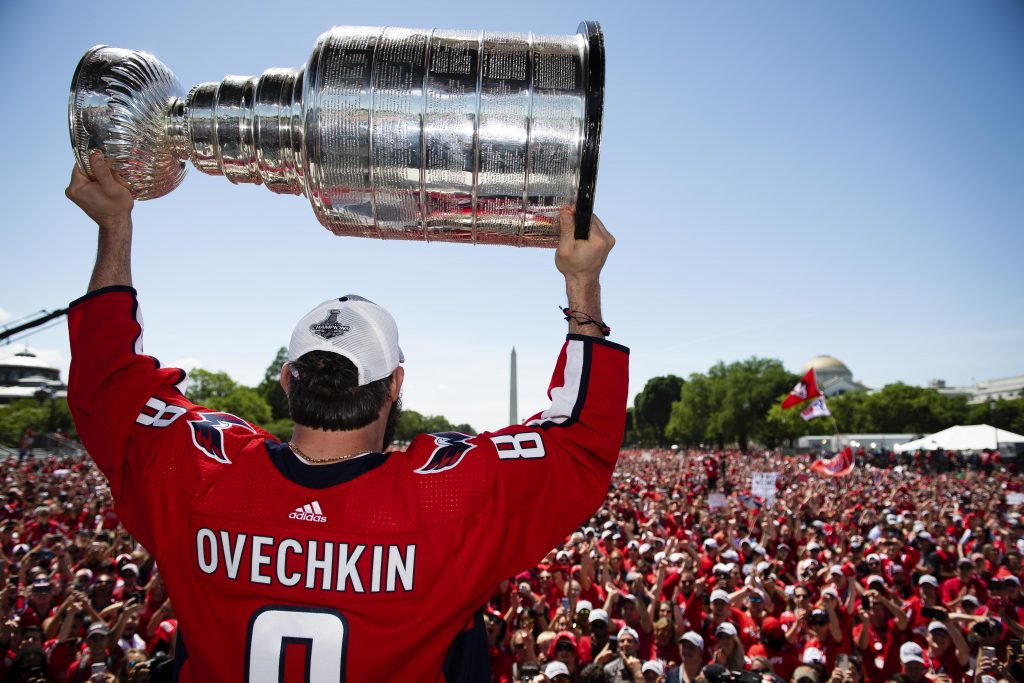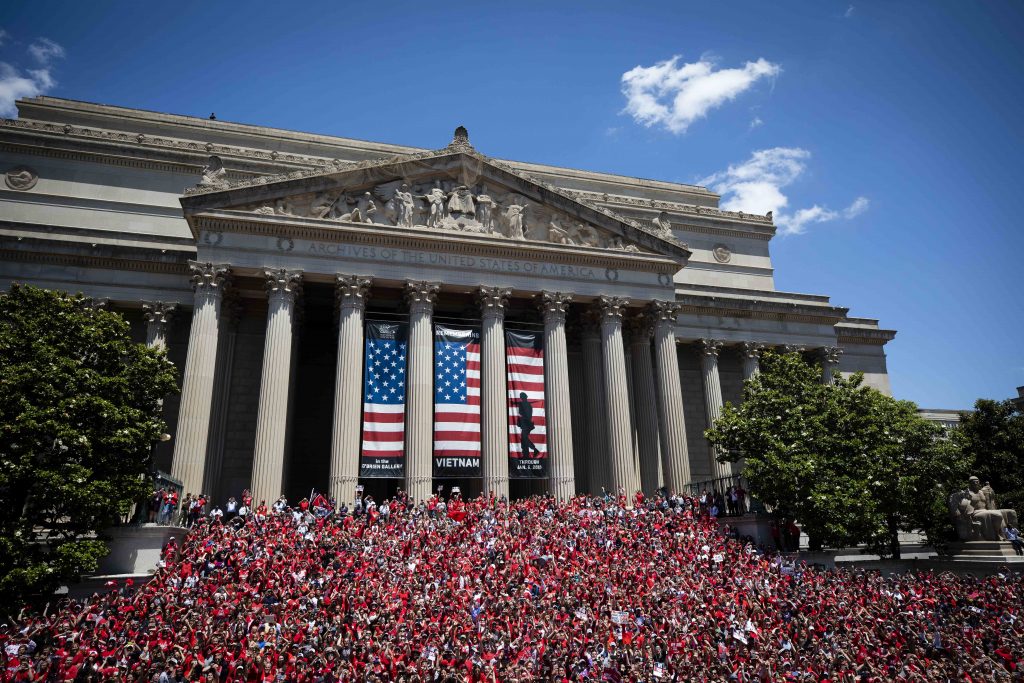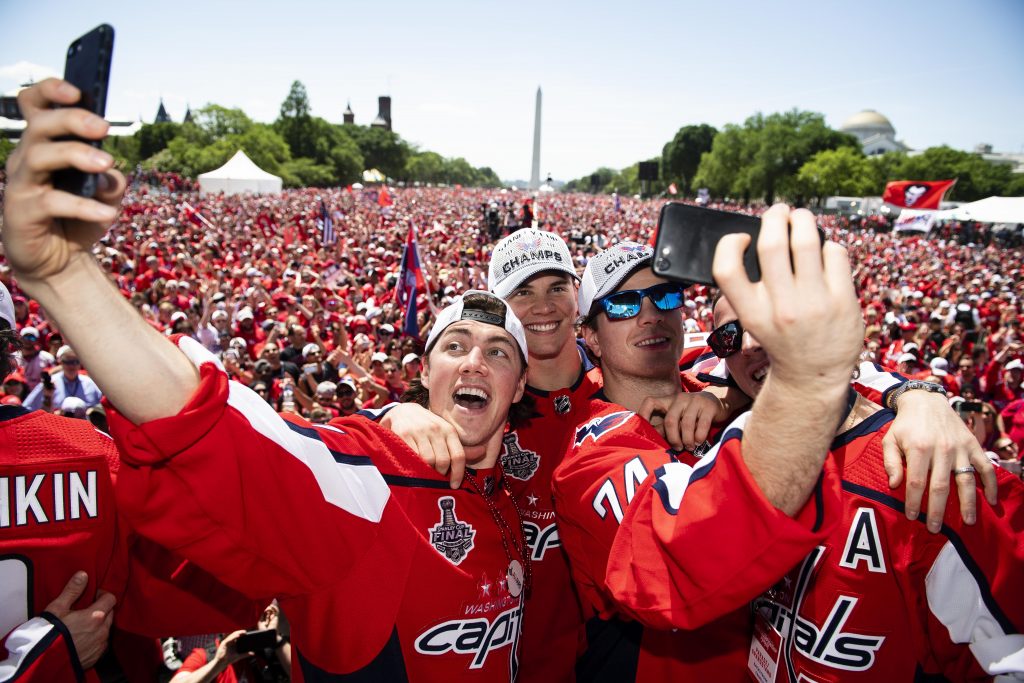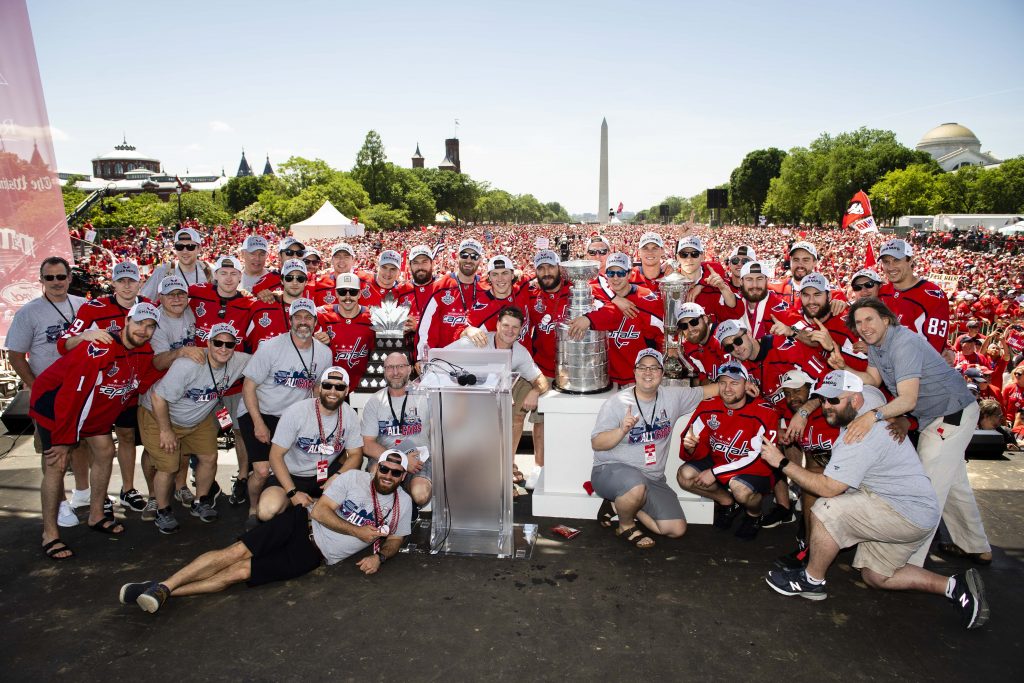
Team captain Alex Ovechkin hoists the Stanely Cup at the Washington Capitals’ victory parade on June 12, 2018 in Washington, D.C. (Photo by Patrick McDermott for the Washington Capitals)
Their hunger was contagious. From the moment the Washington Capitals defeated the Tampa Bay Lightning in the playoffs and moved on to the Stanley Cup finals against the Las Vegas Golden Knights, the city’s hockey fans were ready for the win. Residents went to the office in Caps jerseys. They hosted Super Bowl Sunday-type viewing parties and inundated social media with the hashtag #ALLCAPS. During away games, the Capital One Arena and its surrounding streets overflowed with people of all ages rocking the red, watching the action on massive screens and screaming “We want the Cup!”
When Lars Eller scored the goal that would secure the championship in Game 5 in Las Vegas, massive crowds both inside and outside the arena back home went wild, jumping in unison and altering their chant to “We HAVE the cup!” Some swear the ground shook that night. What is certain is that the win caused a seismic shift in the city’s psyche.
“I was so elated because we had had our hearts broken so many times over the years,” says Jack Davies, a partner in Monumental Sports and Entertainment, which own the Washington Capitals, Wizards and Mystics. “And then to see the TV coverage of the fans filling the streets in D.C. was icing on the cake.”
“We have the greatest fans in the world, and now we have the greatest hockey team in the world,” Ted Leonsis, Monumental’s founder and CEO and the team’s majority owner, proclaimed triumphantly at the Capitals’ victory parade and rally five days later. The hundreds of thousands of fans before him on the National Mall, a literal sea of red, roared in exhilaration. Parade organizers had expected about 100,000 people that day, but crowd estimates numbered as high as 600,000, a figure close to – or more than, depending on which expert one consults – the number of people who attended the inauguration of President Donald J.Trump.

Hundreds of thousands of fans lined Constitution Avenue for the parade. This was the National Archives. (Photo by Patrick McDermott for the Washington Capitals)
No doubt about it, it was a historic turnout for a victory that had been a long time coming.
In its 44-year history, the Stanley Cup, the holy grail of hockey, had never been won by Washington, and not since 1992 had a local professional sports team brought home a world championship. That was the year the Washington Redskins triumphed over the Buffalo Bills at Super Bowl XXVI, seemingly an eternity ago.
This year, all the pieces were in place to purge any ghosts of the past, making Washington the city – now of Jeff Bezos, Michelin-starred restaurants, traffic jams at midnight and cranes reaching to the sky – whole again.
Historically, the Caps have made the playoffs 13 times, placing them firmly in the top five teams in the National Hockey League, yet the chance to score the Cup kept slipping through their gloved hands.
Their archrivals, the Pittsburgh Penguins, took each of the past two postseason series against the Caps (and nine of the past 10) on their way to back-to-back Stanley Cup titles. In 2018, for the third straight year, the Caps and the Penguins met in the second round of the playoffs. But this time the outcome would be different.

Players T.J. Oshie, Andre Burakovsky and John Carlson take a selfie during the victory rally on the National Mall. (Photo by Patrick McDermott for the Washington Capitals)
The Caps moved on to the Eastern conference finals against Tampa Bay, winning the nail-biting series four games to three in Game 7, and then on to the Stanley Cup finals to face the NHL’s year-old franchise, the Las Vegas Golden Knights. In their first match-up, Washington lost 6-4.
In games two, three and four, the Caps battled with fierce, unbridled determination, besting the Golden Knights each time. With their 6-2 lopsided win in Game 4, they were on the cusp of that elusive Holy Grail.
In Game 5, when Danish centerman Eller’s puck crossed the Knights’ net, winning the game 4-3, the hex had been lifted. The clock on their 44-year year quest for the Cup stopped ticking, for good.
Team captain Alex Ovechkin tossed off his helmet and gloves, letting off what appeared to be a primal scream. The 6-foot-3 Russian scoring powerhouse was named playoff MVP and was the first to hoist the Cup after the win. It was a raw, emotional moment when he let out yet another hulking scream, the ultimate release after years of blood, sweat and tears.
“Ovi” or the “Great Eight,” as he’s affectionately called by fans and teammates, had finally met one of his life goals. One was to win the Stanley Cup; the other is to lead the Russian Olympic team to a gold.
The hockey prodigy has spent his entire NHL career in Washington. He was recruited from the Russian Super League by the Capitals, their first overall pick in the NHL entry draft in 2004, when he was just 18. Today, at age 32, he is one of the highest paid players in the NHL, earning $10 million annually. Yet, after years of getting close to the Stanley Cup, then allowing it to slip from his grasp, some observers doubted whether Ovi, who has been called one of the most explosive goals scorers in the league, was worth the price.
The fans stood by their man, and so did the ownership team, a tight-knit group that considers each other and the players, family. They never doubted this day would come.
“I always knew that these players were the best,” Monumental Sports partner Raul Fernandez says. “They are world class athletes. They are smart and hungry. So, of course I believed they would win one day.”
In 2018, Ovechkin rallied his troops and locked his eyes and heart on the prize. The intense focus and dedication he had on reaching his goal (evident to anyone who watched him sprint across the ice) paid off. The Cup would be his.
“I’m particularly happy for Ovi and Nicklas Backstrom because winning the Cup validates the many years of hard work on their parts in trying to bring it home for the fans and for themselves,” says Monumental partner Roger Mody. “This cements their legacies to the game of hockey.

The team and coaching staff pose for a photo with the Stanley Cup as a sea of fans stand behind them on the National Mall. (Photo by Patrick McDermott for the Washington Capitals)
After the win, Ovi joyously posted a photo of himself holding the cup on Instagram. “It’s been 13 years,” he said. “And now me and my boys are Stanley Cup champions!”
The post was liked more than 262,000 times.
“We love you Alex,” responded Michelle Freeman, also a partner at Monumental. “You have shown us what is possible with perseverance and commitment. You never gave up and the victory is that much sweeter.”
But hockey is the ultimate team sport and the victory was also shared with Ovechkin’s tireless teammates, who stepped up to create some of the most memorable moments of the season.
Canadian-born Devante Smith-Pelly, one of the few black athletes in the NHL, scored clutch goals throughout the playoffs, including the important game-tying goal in the championship-clinching Game 5 of the finals.
“I really feel as though Devante Smith-Pelly is the unsung hero of the finals,” says Sheila Johnson, founder of Salamander Resorts and “another Monumental Sports partner. “His amazing goal really turned the tide in the final game and I think he needs to be recognized for that.”
The fans did recognize Smith-Pelly, chanting his name in the Capital One Arena.
And then there was Braden Holtby’s seemingly impossible save in the final moments of Game 2, when he extended his arm to stop what was a sure goal on an open net by Vegas’ Alex Tuch, a move that helped preserve the win.
The players’ personal stories and the owners’ and the team’s commitment to the community also took center stage after the victory, endearing them to their fans even more.
Less than a week after winning the Cup, Leonsis and Ovechkin spent the entire afternoon driving around with the trophy, visiting young players at Fort Dupont Ice Arena, police officers at an Arlington station and kids at MedStar Children’s Hospital. Defenseman John Carlson took the cup to Bethesda in early July, posing with fans to help raise money to fight brainstem cancer. And in an emotional visit, longtime Capitals equipment manager Woody Leydig brought the Cup to the makeshift offices of the Capital Gazette in Annapolis, after a gunman killed five editors there. It was a much-needed morale boost for the beleaguered newspaper team who had spent the last few days attending memorial services for their murdered colleagues.
In a television interview after the championship win, a teary T.J. Oshie talked about his father, who suffers from Alzheimer’s disease. “My dad doesn’t remember a lot of stuff these days,” said Oshie. “He remembers enough. But I tell you what … this one will stick with him forever. You can guarantee that.”
There’s no doubt that this win will stick with Washingtonians forever, too. The players and owners plan to make sure of that, because for them, it is all about the fans. “We’re absolutely nothing without you guys,” screamed center and alternate captain Nicklas Backstrom to the sea of red filling the National Mall on parade day.
As the Queen song that blared along Constitution Avenue during the victory parade goes, “We are the champions, my friends.”
John Arundel, Virginia Coyne, Erica Moody and Catherine Trifiletti contributed to this report.
This story appears in the Summer 2018 issue of Washington Life Magazine.




